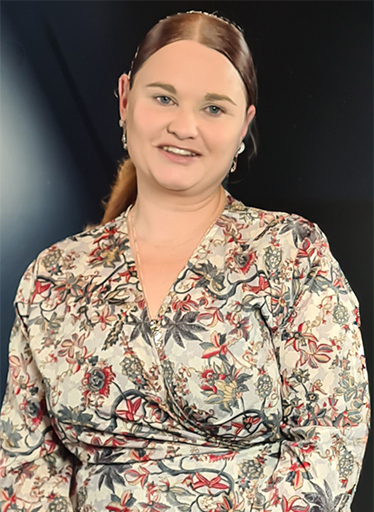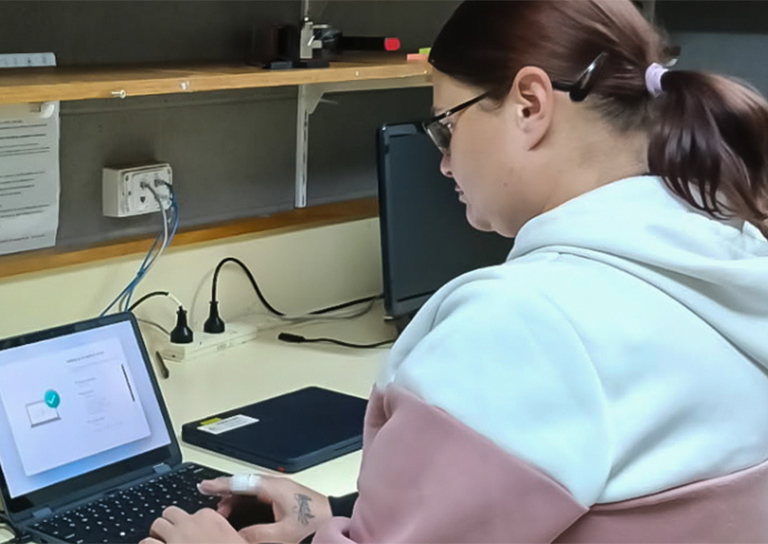
“Run your own race. No matter where you start from, how many setbacks you’ve had, or how messy your life feels, there’s always a way forward.”
Sabrina Blundell didn’t take the usual path into the world of ICT (Information and Communications Technology). But her story shows that there’s no one “right” way to chase your goals – especially when you’re willing to back yourself, ask for help, and keep going even when things get tough.
Sabrina is a neurodiverse adult learner, a full-time parent, and now a tech professional working across four primary schools in Launceston. Her journey is all about resilience, finding the right support, and discovering what she’s truly capable of.
School wasn’t easy
Back in high school and college, Sabrina struggled with bullying and mental health. She started four uni degrees but didn’t finish any of them. She often felt overwhelmed and like she didn’t fit in.
“I just knew I was different, but I didn’t know why,” she said. “It felt like everyone else had a guidebook for life and I was stuck trying to figure out the basics.”
Eventually, Sabrina got some answers. She was diagnosed with ADHD at 33, and Autism (ASD Level 2) at 34. She now proudly identifies as an “AuDHDer” – a term used by people who have both ADHD and Autism.
“It explained why life had felt so hard,” she said. “Why I couldn’t seem to stick with anything long term.”
Starting fresh at TasTAFE
With two neurodiverse kids and a busy home life, Sabrina and her husband chose to homeschool their children in a way that worked best for them. But Sabrina also wanted to explore her interest in tech – so she applied to study ICT at TasTAFE.
At first, the course was full. But when a spot opened up, she jumped in, joined late, and quickly caught up. She worked hard, helped her classmates, and showed up every day ready to learn.
Her teachers and TasTAFE’s Disability Liaison Officer, James Newton, helped create a Learning Access Plan that made a big difference. They adjusted things like:
- Giving fixed due dates instead of flexible ones
- Releasing full-term modules early so she could plan ahead
- Making changes to the online learning system so she could track her progress
- Suggesting adaptive tech tools
- Offering clear teamwork strategies
“From day one, I felt like I could ask questions and get support,” Sabrina said. “Being neurodivergent doesn’t mean you’re weak – it means you might need different tools to succeed.”
Balancing study and parenting
Studying while parenting wasn’t easy. Sabrina had to find ways to balance her time and energy. Her advice to other young parents?
“Go for it – but be realistic. Think about your support systems, why you’re studying, and how flexible the course is. If you’re doing it to grow, to create stability, or to set an example for your kids, those are powerful reasons. And remember, there’s no perfect timeline. It’s OK to take breaks or change direction.”
Landing the job
On the same day she submitted her final assignment, Sabrina was offered a contract role as an IT Support Officer with the Department for Education, Children and Young People (DECYP). Now, she helps teachers with tech troubleshooting, software installs, and digital learning across four schools – including Riverside Primary, where her kids go part-time.
She’s known for being approachable, practical, and great at building confidence in others. One principal even said they wished she could work at their school full-time!
Her message to you
Sabrina’s story is proof that learning can change your life – no matter where you start or what challenges you face.
“Run your own race,” she said. “It doesn’t matter how messy things feel or how many setbacks you’ve had. There’s always a way forward.”
Original story courtesy of TasTAFE

Find out more
Explore ICT careers through the Bachelor of Information and Communication Technology, Diploma of ICT Professional Practice, and Master of Information Technology and Systems at the University of Tasmania. Alternatively there are VET pathways like the Diploma of Information Technology at TasTAFE. Build skills in cybersecurity, networking, software development, and data analytics, with practical experience through projects and industry partnerships.
Even while you’re still in school, you can begin building your future through Work-based Learning (WBL), School-based Apprenticeships (ASbA), and VET qualifications. These programs give you hands-on experience and real-world skills to prepare for a successful career in ICT.

